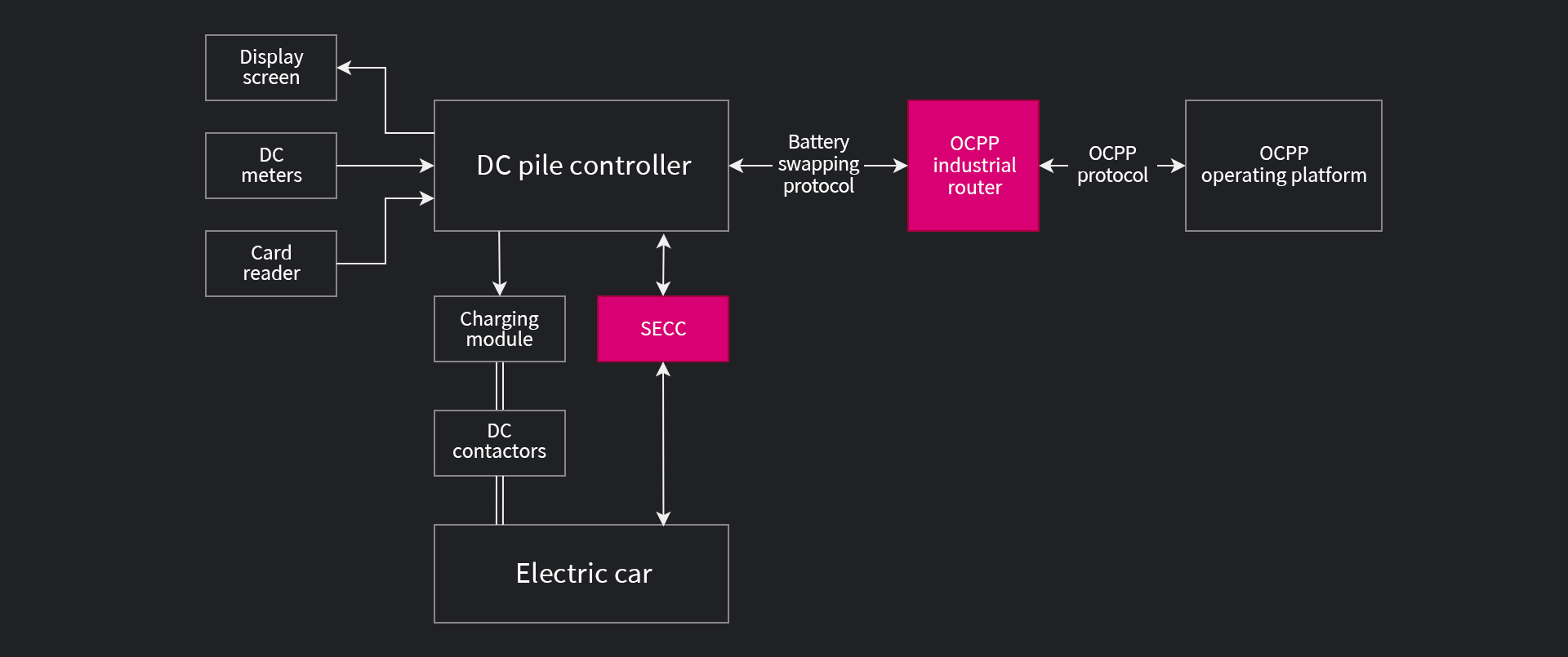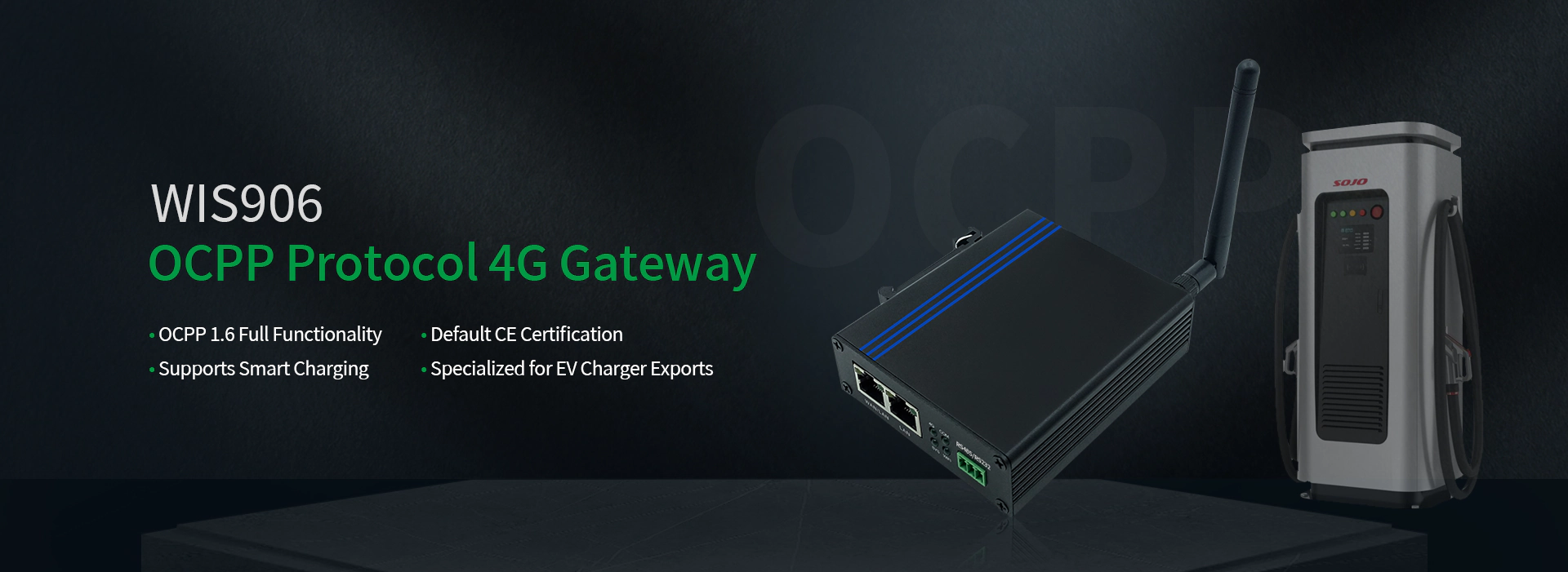
Empowering EV Chargers
Achieving seamless integration of OCPP protocol through 4G industrial routers
Introducing our cutting-edge 4G Industrial Router with Embedded OCPP Protocol, a game-changer for the electric vehicle (EV) charging industry. This innovative product is designed to seamlessly integrate EV chargers that do not natively support the Open Charge Point Protocol (OCPP) with OCPP-enabled backends, unlocking a suite of powerful management functionalities.
Our router acts as a bridge, enabling efficient communication between non-OCPP charging stations and sophisticated OCPP management systems. By embedding the OCPP protocol directly into the 4G industrial router, we ensure reliable and secure data transmission over cellular networks, even in remote locations. This integration facilitates real-time monitoring, remote diagnostics, and dynamic load management, enhancing the operational efficiency of charging networks.

Key features include robust security protocols, easy installation, and compatibility with a wide range of charging stations. The router’s durable design is built to withstand harsh industrial environments, ensuring consistent performance and longevity. With our product, operators can effortlessly upgrade their existing infrastructure, providing end-users with a seamless and efficient charging experience.
Embrace the future of EV charging with our 4G Industrial Router with Embedded OCPP Protocol, and transform your charging network into a smart, connected ecosystem.
Challenges
Integrating the Open Charge Point Protocol (OCPP) with existing EV chargers that do not originally support the protocol can present several challenges. Here are some of the key issues that might arise:
Hardware Limitations
Older charging stations may lack the necessary hardware capabilities to support OCPP. This can include insufficient CPU power, memory, or connectivity options to handle the protocol’s requirements, especially with newer versions like OCPP 2.0.1 that demand more resources for features such as client-side authentication and Plug & Charge support.
Firmware Upgrades
Some existing chargers may not support firmware updates, which are often necessary to implement OCPP. This can make it difficult to upgrade the software to support the protocol without significant hardware modifications.
Protocol Versions
Different versions of OCPP (e.g., 1.5, 1.6, 2.0.1) have varying capabilities and are not always backward compatible. This can lead to interoperability issues if the EV chargers are not updated to the latest version or if they are incompatible with the backend system’s version.

Complex Integration
The integration process can be technically complex, requiring significant changes to both hardware and software systems. This complexity can increase the risk of errors and require specialized technical expertise to resolve.
Data Management
Managing the data flow between non-OCPP compliant EV chargers and the backend can be challenging. Ensuring accurate data exchange for functionalities like smart charging and remote diagnostics requires robust system architecture.
Retrofitting Costs
Upgrading existing infrastructure to support OCPP can be costly. This includes potential expenses for new hardware, software development, and labor for installation and testing.
Data Security
Implementing OCPP involves ensuring secure data transmission between the EV chargers and the backend system. This requires implementing robust security measures to protect against cyber threats, which can be particularly challenging for older systems not designed with modern security standards in mind.

Key Features
OCPP Protocol Integration
By embedding the OCPP protocol, our router enables seamless communication between legacy charging stations and modern management systems, facilitating advanced control and monitoring.
4G Connectivity
The router leverages 4G connectivity to ensure reliable and fast data transmission, even in remote or challenging environments, providing uninterrupted service.
Real-Time Monitoring
Operators can access real-time data on charging status, energy consumption, and station performance, allowing for proactive maintenance and management.
Remote Diagnostics and Management
The router supports remote diagnostics, reducing the need for on-site visits and enabling quick issue resolution, thus minimizing downtime.
Dynamic Load Management
With dynamic load management, operators can optimize energy distribution across charging stations, balancing demand and preventing overloads.
Wide Compatibility
Our router is compatible with a broad range of EV charger models, making it a versatile solution for upgrading existing infrastructure.
Simple Installation
Designed for easy installation, the router can be quickly integrated into existing systems, minimizing deployment time and costs.
Robust Security Protocols
Equipped with advanced security protocols, the router ensures data integrity and protection against cyber threats.
Industrial-Grade Durability
Built to withstand harsh industrial environments, the router offers reliable performance and longevity, ensuring consistent operation.
Technical Specifications
Summary of The Technical Specifications

Security Features That Ensure Safe Data Transmission
